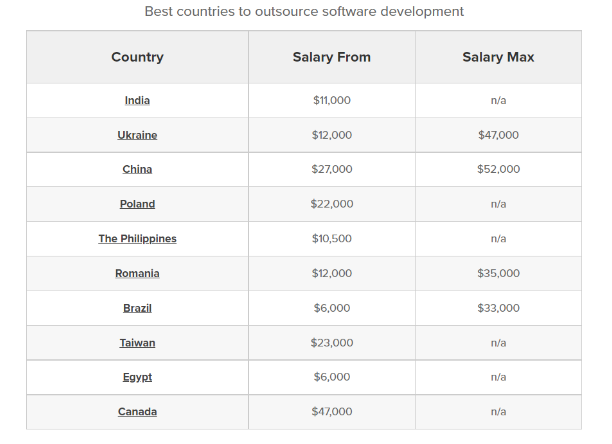
Software engineering is an increasingly desirable profession. With so many open developer positions, people are flocking to earn computer science degrees and start working.
However, while the number of engineers looking for jobs is considerable, true talent is scarce.
And since you need a great team to produce excellent results, recruiters find themselves in front of many challenges that come with hiring tech professionals.
If you too find the process of hiring developers challenging, you’re not alone—in fact, you belong to the majority (86%) of recruiters who share the opinion.
However, you can’t start fixing a problem if you don’t know its source. To help you recognize and overcome the challenges of hiring engineers, we’ll walk you through the six most common ones.
Table of Contents
Lack of uniformity in education
Bachelor’s degrees, master’s degrees, coding boot camp certificates, self-taught developers—you’ve probably seen it all in developer job applications.
Unfortunately, none of these titles indicate the level of skill with absolute accuracy. The only way to combat this engineer hiring challenge is with coding tests.
If you’ve ever talked to a teenager reluctant to study, they’ve probably cited the “But Mark Zuckerberg dropped out of college, and he’s doing fine” argument.
You then had to explain that, while that technically is the truth, Zuckerberg quit Harvard, and getting to that point is already a significant accomplishment.

Get unreal data to fix real issues in your app & web.
Besides, by the time he quit, he had already developed what would become a world-changing platform.
Nevertheless, your little cousin does have a point; a diploma is no longer a guarantee of professional success, especially for software developers.
The image below shows a job ad for iOS developers at Meta, previously known as Facebook. As you can see, there’s no degree requirement.

Another ad for a frontend engineer at the same company mentions a CS degree, but only as a preference, not a strict requirement. It seems like Zuckerberg, who now holds an honorary degree from his former alma mater, remembers his roots.
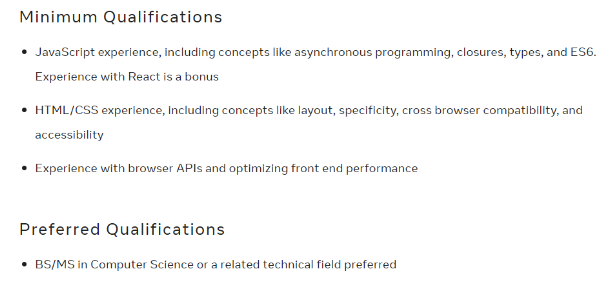
The point is, if tech giants such as Meta, Google, and Apple have stopped requiring a certain level of education, there must be a reason behind that. The explanation lies in the lack of uniformity in software engineer education.
While a formal degree means that engineers have obtained a structured and possibly broader education, it still doesn’t guarantee that a fresh-out-of-college engineer can apply the theory to practice.
On the other hand, self-taught engineers or those who have completed coding courses may be able to better keep up with the way the technology evolves, even if they’re not familiar with binary trees.
So, whether you belong to the 80% of recruiters who hire developers from non-academic backgrounds or not, you should keep in mind that a diploma doesn’t certify skill.
Considering that a rising number of companies nowadays hire remote developers from around the world, you should also be mindful of the fact that universities across the countries have different standards for issuing degrees.
Since you can’t count on uniformity in education to help you select the most capable engineers, the only thing you can do is test all candidates you consider for the position.
Limited talent pool
Although the job market is brimming with software engineers, finding and hiring the right one for your company can be challenging due to the limited talent pool for the technology or the exact skills you need.
If you need to fill a position related to web development, or maybe Android or iOS development, you’re in luck.
These technologies have been here long enough that the internet is packed with learning materials accessible to engineers wanting to learn.
With more people mastering the aforementioned technologies, employers can easily fill the spots. Even if there are no candidates in your immediate area, you can rely on remote workers.
CodeinWP has compiled a list of countries they recommend for outsourcing software engineers depending on developer skill and the cost.
You can find the result of their analysis in the table below. The full post with explanations and additional details is available here.
However, what happens if you need an engineer to tackle some more exclusive technologies, such as IoT, AI, or augmented reality?
You’d likely have to keep looking for candidates longer, or offer a competitive salary, a compelling employee value proposition, and other perks used for attracting the best developer talent.
Even so, top-level engineers working with niche technologies are usually recognized by their employers, who incentivize them to stay with bonuses and other employee retention measures.
Hiring remotely could help you here as well. However, bear in mind that the process of finding a suitable candidate would be slower than if you wanted to hire developers dealing with more standard technologies.
Still, you shouldn’t let the limited pool of local talent limit your company’s potential. Brace yourself with patience, compose a captivating job description, and you’ll overcome this challenge successfully.
Fierce market competition
If you’re recruiting for a smaller business or a startup, you’ve most likely come across the problem of fierce competition.
Luckily, you don’t have to match HubSpot’s unlimited vacation days to attract engineers; there are other ways your company can stand out on the job market.
As Forbes puts it, it’s a buyers market for tech jobs at the moment. With so many companies looking for IT personnel, engineers can choose where they want to work.
The companies then put their best foot forward and hope that skilled engineers pick them. A high salary is still the primary motivator for developers to change jobs, so it’s great if you can afford to use the compensation as a selling point.
Big businesses also have a bigger budget to put towards building employer branding.
Yet, some developers consciously choose to work for companies that can’t offer dizzying salaries because they find company values more important.
You can turn that trend to your advantage and win engineers over.
For instance, this Backend Engineer job advertisement has the keywords sustainable startup in the job title.
If an environmentally-conscious engineer is looking for a job, it’s more likely they’ll click on this job and sooner than on a regular one.
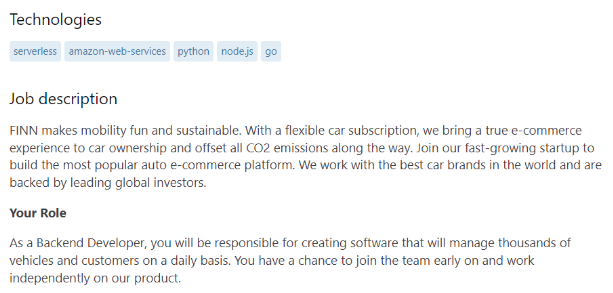
The job description continues to describe how the company works on a sustainable car subscription model, resulting in CO2 emissions offset.
So, if your company is built around a specific value, don’t be afraid to use it as a hook. This could also help you attract candidates who value similar principles, ensuring the cultural fit from the start.
Of course, dancing around the salary subject and focusing on all other perks the employees get could be perceived as shady.
The image below shows a Vue.JS Front End developer job advertisement that doesn’t offer “traditional salaries”, but a stay in a “perk-filled villa in paradise”.
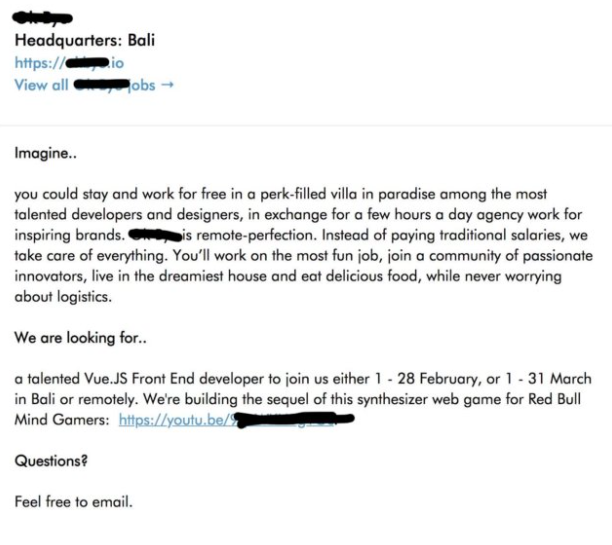
While this job sounds like the perfect opportunity for those not interested in earning money to pay for insurance, or you know, clothes, an average engineer would probably not apply.
All in all, you can position yourself as a market competitor even if your company is not that renowned yet. Make an effort to highlight what makes you unique, polish your mission and vision, and promote the work-life balance you can offer.
You never know when an engineer fed up with corporate life might decide to look for more purposeful work.
High compensation requirements
Many large companies are competing for the workforce, and as a result, compensation requirements tend to get high. However, good talent is worth paying for, so you should consider rethinking your pay structure.
Let’s kick this section off with some figures to put things in perspective. We’ll use data provided by Triplebyte, a software engineering job search platform.
According to their calculations, an average base salary for US software engineers amounts to $152K.
For senior developers with at least eight years of experience, the salary is $20K higher than the average.
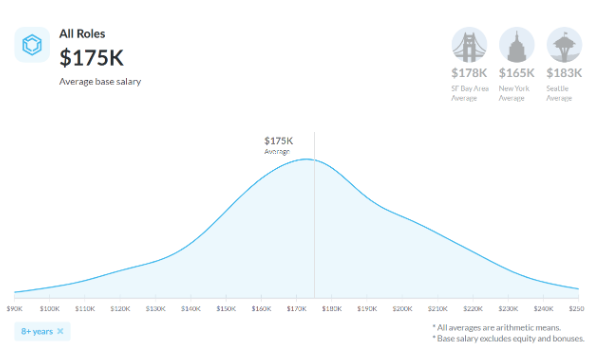
Consistently, the average drops when you look at beginner developers only.

The fact that experienced developers get bigger salaries is hardly surprising, but employers sometimes forget the value excellent developers bring to the company compared to good ones.
Since not every company has the luxury of indefinitely rising compensation until the team of first-rate engineers is assembled, smaller companies usually have a fixed budget to distribute as they see fit.
Such a financial challenge may affect your hiring decisions.
If you have a project to finish, the first instinct could be to hire as many engineers as you can afford. However, hiring one outstanding engineer is often more effective even if they ask for a higher pay.
For instance, Netflix CEO Reed Hastings prefers to hire fewer but better.
“With a fixed amount of money for salaries and a project I needed to complete, I had a choice: Hire 10 to 25 average engineers, or hire one ‘rock-star’ and pay significantly more than what I’d pay the others, if necessary.
Over the years, I’ve come to see that the best programmer doesn’t add 10 times the value. He or she adds more like a 100 times.”
When you consider the bigger picture, you’ll figure that the challenge of high compensation requirements is mostly justified.
Therefore, rather than looking at employee compensation as a burden on your company, try to think of it as an investment necessary to make headway.
If you still think that your budget constraints prevent you from hiring excellent engineers, keep in mind the power of company values we’ve previously mentioned as a tool to get a better position among competitors.
After all, money is important, but it’s not everything.
Need to speed up the recruitment process
If it was up to employers, companies would take months to assess each candidate in detail to find the perfect one.
However, engineers resent lengthy recruitment processes, which forces employers to speed up their hiring practices.
Do you know who FAANG companies are?
If not, the following image should make things clearer.

The prestige of tech giants such as Facebook/Meta, Apple, Amazon, Netflix, and Google allows them to draw out the recruitment process because they know candidates are willing to wait however long it takes.
For instance, engineers applying to positions at Apple report that the hiring process takes several months, and yet you won’t see many candidates refusing the offer just because of the duration.
But if your company doesn’t belong to FAANG, you should be aware that the candidates won’t be as patient with you.
In fact, 66% of candidates give the potential employer only two weeks to get back to them. If there’s no contact during their period, they move on to another opportunity.

So, how can you shorten the recruiting process while retaining its quality?
First of all, you should define the exact role you’re looking for before posting an advertisement.
Casting the net too wide will result in getting more applications than your team can handle, lowering your capacity to communicate with relevant candidates.
Next, keep in mind that engineers dislike lengthy, irrelevant interview questions, so you should try to adapt yours accordingly.
Finally, try not to wait too long before informing the candidates of whether they’re moving on to the next stage. You don’t want to overstep the two-week period it takes for them to move on to another opportunity.
High costs of hiring software engineers
The costs of hiring engineers don’t only consist of employee wages and benefits; the entire process of recruiting and hiring is long and expensive.
Let’s say you’re in a position where you need to complete a project to get paid. However, to deliver the product, you first have to hire engineers.
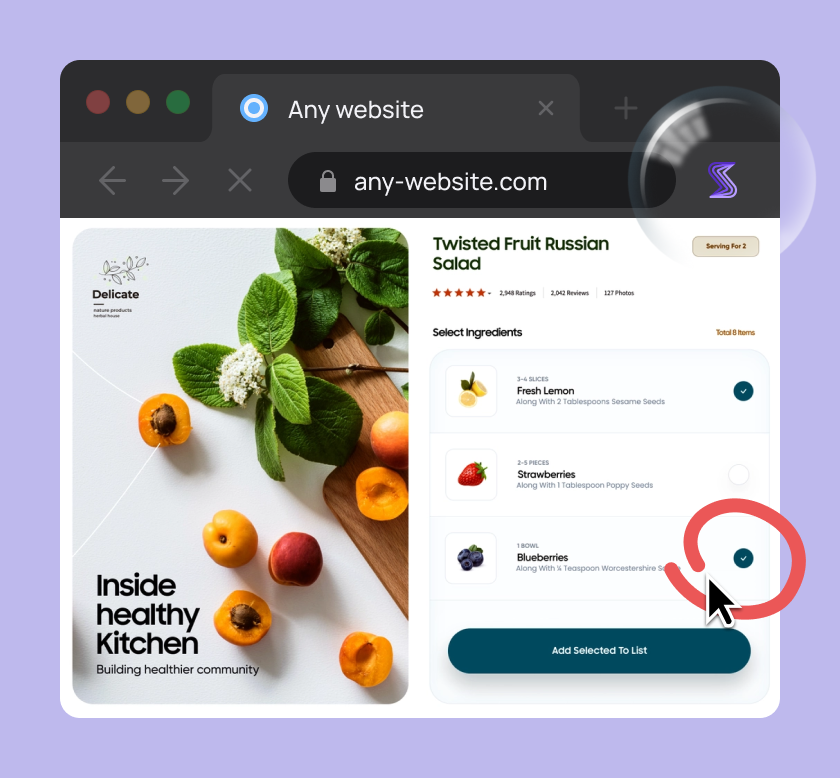
Capture, Annotate & Share in Seconds with our Free Chrome Extension!
This means you have to invest in an HR department and pay for their hours until the right candidates are found.
You can see how the costs easily rack up even before you assemble the team.
An SHRM report on human capital estimates the cost of hiring an employee at more than $4,000. The duration of the process is estimated to be longer than a month.

These figures refer to hiring a single person, and if you’re hiring for a software company, chances are you need an entire team.
The expense of recruiting and hiring full-time employees is the reason why some companies choose to work with freelancers. The process is easier and more affordable—but it’s not always as effective in the long run.
Drew Dorgan of Workhorse Development finds freelancers unreliable and prefers forming an in-house team.
“It’s very hard to find talent that is affordable for building apps for my level of clients. I ended up hiring freelance people—this way, you get someone who is really excited about your project at the beginning, starts building it, and then sort of fades away.”
Whether you’re looking to form an internal team or decide to try your luck with freelancers, remember that the longer the recruitment process, the more resources you’re draining.
However, rushing to fill the position only results in additional problems, such as quick churn, loss of quality, and consequently, loss of revenue.
To get your money’s worth from the funds you supply for recruitment, you should devise an efficient hiring process.
Plan all the elements ahead, come up with evaluation criteria, and try to avoid common developer hiring mistakes.
Having a set of predefined guidelines will help you avoid the trial and error method, making the process more cost-effective.
Conclusion
Hiring is always stressful. You spend so much time poring over CVs and references, and you still can’t be sure if you’ve made the right decision until the candidate starts working.
The costs associated with the recruitment process can also hinder the progress of forming a team and delivering the product. However, you can still find talented developers, even though you have to try a bit harder.
Now that you know what the frequent engineer challenges are, you can identify if they’re present in your hiring practices and overcome them with planning and tweaking the way you strategize the hiring process.

